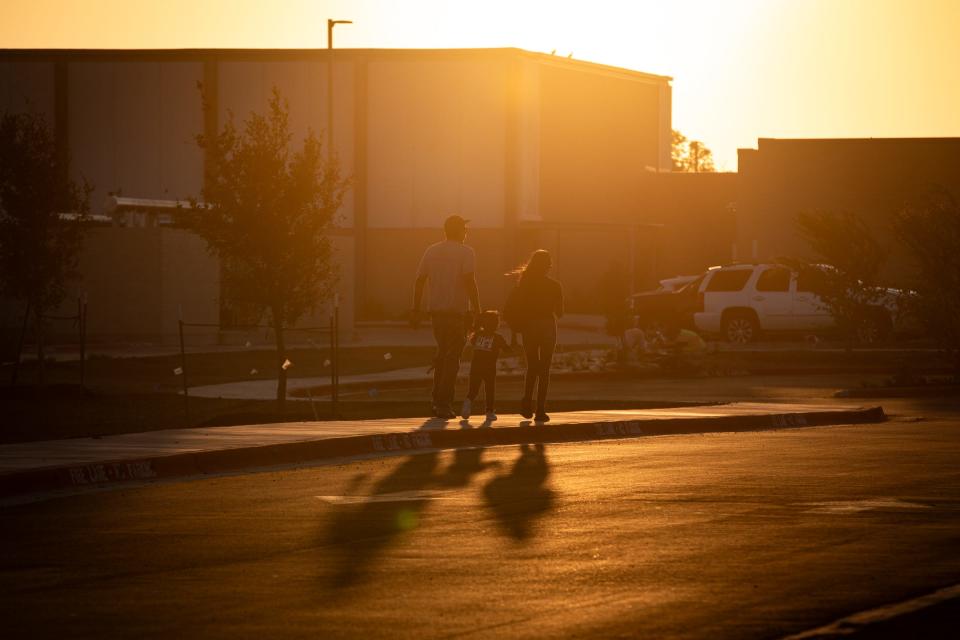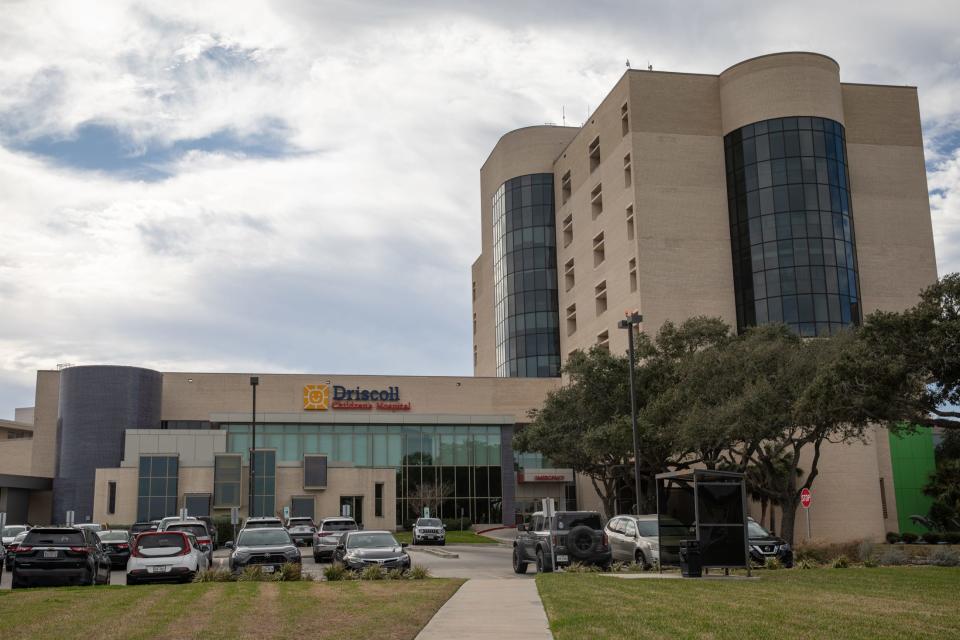Here's how Driscoll Children's Hospital has provided therapy in Corpus Christi ISD
A year ago, local health professionals, philanthropists and educators came together to address rising numbers of young children experiencing a mental health crisis.
Hoping to make therapeutic services more accessible for families and to reach children before they reach the point of needing to visit an emergency room, Driscoll Children’s Hospital and Corpus Christi ISD partnered on a pilot program that has placed mental health professionals in six schools.
The program is funded by the Coastal Bend Community Foundation through an $800,000 grant from a local private estate and family foundation. This means the school district can devote financial resources to other priorities and programs.
Each of the six specialists now have full caseloads. They say they’re starting to see results.
Midway through the spring 2023 semester, mental health professionals began working in Moody High School and Mireles, Berlanga, Montclair, Shaw and Travis elementary schools.
“We’re providing individual therapy and group therapy to students at the schools to help them with their mental health struggles,” mental health specialist Angela Wallace said. Wallace is stationed at Moody High School.
When the spring semester ended and the district shifted focus to summer school programs, the mental health specialists continued to provide therapeutic sessions and crisis support to students in summer credit recovery programs at Hicks, Travis, Shaw and Calk Wilson elementary school, as well as Carroll High School.
This fall, the specialists had the chance to work for their first full semester in the schools. Because Montclair Elementary School merged with Meadowbrook and Woodlawn elementary schools, a specialist was assigned to the new consolidated Cullen Place Elementary School. Specialists returned to Moody High School and Mireles, Berlanga, Shaw and Travis elementary schools.

What services are being provided?
The program has five goals – to destigmatize seeking help for anxiety, depression and emotional disturbance, for mental health specialists to develop relationships with students and staff, for mental health specialists to be available for students seeking help, to provide support for teachers dealing with behavioral issues and to offer a parenting program for families seeking to create positive relationships with children.
Parent permission is required before the specialists can begin working with a child. Students at participating campuses can access these therapeutic services regardless of what insurance their family might have or their ability to pay – there is no cost to families.
Over the course of the fall semester, the specialists provided crisis intervention, emotional support and mental health assessment services. They met repeatedly with some students and held family sessions.
“A lot of what I do when I work with littles is behavioral activation and engagement,” Chris Gilbert, the specialist stationed at Travis Elementary School, said.
He often focuses on play because playing can be a source of contention for children. It’s also a big source of communication.
“We do a lot of role-playing with the kids,” Gilbert said, giving the example of an exercise on how to ask for a toy nicely.
The specialists also create safe spaces for children to come to if they are feeling overwhelmed. A teacher might also send a child to see the specialists if the child is being disruptive or having behavioral challenges and needs a space to calm down.
“It’s normalizing seeking help for mental health,” Wallace said. “...there’s some resistance to seeking help for mental health. A lot of times I’ve had students say, ‘I would never have gotten to see anyone if it wasn’t for you being here.’”
What are the results so far?
A report from Driscoll Children’s Hospital on the program gave examples of encounters of some of the struggles children face about how the specialists sought to help them. Some of the children sought help or were referred to the specialists because they were practicing self-harm or had suicidal thoughts.
In one case, a specialist was asked by a teacher to visit with a high-performing student who seemed upset. The student was struggling with depression and had a suicide plan, according to the report. The specialist helped the student get access to in-patient care.
In another case, a specialist helped a young student speak to their parent about self-harm and together they created a safety-plan.
Lisa McKenna is a behavioral health manager at Driscoll Children’s Hospital who works with the team of mental health specialists. The specialists are all licensed professional counselors.

The program is a response to an increase in young patients coming into the emergency department struggling with depression and suicidal ideation, McKenna said.
By placing mental health professionals licensed to the school setting, the program aims to reach students before a crisis develops.
Wait times can be long for out-patient care, McKenna said. And, once a family finds appropriate services for their child in the community, they might have to leave during the school day to attend appointments. A parent might have to leave work or find a babysitter for other children in order to take their child to appointments.
Partnering with the schools removes many of those barriers, McKenna said.
The specialists say that being in the school environment is important because it means that they have a better understanding of what’s happening on campus. The specialists also have the chance to see children when things are going well.
“One of the cool things about our job is we get to support the child, like if they’re in the spelling bee or something school-related, we get to go and support them,” said Ludivina Montemayor-Allred, the specialist assigned to Mireles Elementary School.
Wallace, the specialist working at Moody High School, said that when some of her children are struggling with anxiety, they might not come to school every day. In those cases, Wallace can help families arrange telehealth sessions so that the student can get the services that might help get them back into the classroom the next day.
Gilbert said that a recent kite day activity at his school was a good opportunity to connect with parents.
“One of our big barriers to working with students is that behaviors might show up differently at home versus here at school,” Gilbert said. “When we have those opportunities for parents to come to the school and see a positive difference in behavior, that gives us an opportunity to have conversations with parents.”
Right now, the Driscoll mental health specialists are only set up at six Corpus Christi ISD schools. But there are more than 30 schools in the district.
Maria Iyescas, the coordinator for mental health services in Corpus Christi ISD, said that the specific schools were chosen based on the number of social work referrals at each campus and data on threats of harm to self from students. The district focused on mainly elementary school campuses to provide more preventative services.
It might take some time to see the full effects of the program, Iyescas said, because the specialists have not been on campus for a full school year yet and therapy can take time.
“But I can tell you in this time, they have helped us to serve so many more students,” Iyescas said. “They’re providing something unique that we counselors can’t provide, that social workers can’t provide, and that’s therapeutic services.”
School counselors and social workers can provide short term solution-focused counseling. In schools without licensed mental health professionals, students in need of therapeutic services are referred to outside community agencies.
“CCISD recognizes that if a child is not doing well mentally... they’re not going to be successful (in the classroom),” Iyescas said. “We have to address whatever issues they’re having or whatever trauma they’ve experienced and give them the tools so that they can move forward and be successful in the classroom. That’s why this partnership is so very important to us.”
Already, the specialists have begun to see signs that they’re having a positive impact when they look at how far some of the students they’re working with have come. Wallace said that one measure she turns to is attendance rates.
“The biggest sign that we’ve been successful is if the kid is coming to us not on a bad referral, but because the teacher wants to send them down to brag on themselves,” Gilbert said. “We have teachers telling us, ‘I’ve noticed a significant improvement.’ We’re seeing that change with a kid where they’re more socially interactive with peers and they’re building relationships.”
Nueces County plans to ensure ER residency program future with or without Christus Spohn
Del Mar College to offer free EMT-training program
Flour Bluff ISD students see canal work at Whitecap Preserve
This article originally appeared on Corpus Christi Caller Times: What to know about Driscoll Children's Hospital's CCISD partnership

